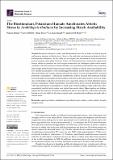Por favor, use este identificador para citar o enlazar a este item:
http://hdl.handle.net/10261/332580COMPARTIR / EXPORTAR:
 SHARE SHARE
 CORE
BASE CORE
BASE
|
|
| Visualizar otros formatos: MARC | Dublin Core | RDF | ORE | MODS | METS | DIDL | DATACITE | |

| Título: | The Biostimulant, Potassium Humate Ameliorates Abiotic Stress in Arabidopsis thaliana by Increasing Starch Availability |
Autor: | Benito, Patricia; Bellón, Javier; Porcel, Rosa CSIC ORCID; Yenush, Lynne CSIC ORCID; Mulet-Salort, José Miguel CSIC ORCID | Palabras clave: | Organic agriculture Metabolomics Agricultural inputs Maltose Proline Salinity Drought Energetic status |
Fecha de publicación: | 28-jul-2023 | Editor: | Multidisciplinary Digital Publishing Institute | Citación: | International Journal of Molecular Sciences 24(15): 12140 (2023) | Resumen: | Potassium humate is a widely used biostimulant known for its ability to enhance growth and improve tolerance to abiotic stress. However, the molecular mechanisms explaining its effects remain poorly understood. In this study, we investigated the mechanism of action of potassium humate using the model plant Arabidopsis thaliana. We demonstrated that a formulation of potassium humate effectively increased the fresh weight accumulation of Arabidopsis plants under normal conditions, salt stress (sodium or lithium chloride), and particularly under osmotic stress (mannitol). Interestingly, plants treated with potassium humate exhibited a reduced antioxidant response and lower proline accumulation, while maintaining photosynthetic activity under stress conditions. The observed sodium and osmotic tolerance induced by humate was not accompanied by increased potassium accumulation. Additionally, metabolomic analysis revealed that potassium humate increased maltose levels under control conditions but decreased levels of fructose. However, under stress, both maltose and glucose levels decreased, suggesting changes in starch utilization and an increase in glycolysis. Starch concentration measurements in leaves showed that plants treated with potassium humate accumulated less starch under control conditions, while under stress, they accumulated starch to levels similar to or higher than control plants. Taken together, our findings suggest that the molecular mechanism underlying the abiotic stress tolerance conferred by potassium humate involves its ability to alter starch content under normal growth conditions and under salt or osmotic stress. | Versión del editor: | https://doi.org/10.3390/ijms241512140 | URI: | http://hdl.handle.net/10261/332580 | DOI: | 10.3390/ijms241512140 | ISSN: | 1661-6596 | E-ISSN: | 1422-0067 |
| Aparece en las colecciones: | (IBMCP) Artículos |
Ficheros en este ítem:
| Fichero | Descripción | Tamaño | Formato | |
|---|---|---|---|---|
| Biostimulant_Benito.pdf | 8,73 MB | Adobe PDF |  Visualizar/Abrir |
CORE Recommender
SCOPUSTM
Citations
3
checked on 25-abr-2024
WEB OF SCIENCETM
Citations
3
checked on 23-feb-2024
Page view(s)
47
checked on 28-abr-2024
Download(s)
31
checked on 28-abr-2024
Google ScholarTM
Check
Altmetric
Altmetric
Este item está licenciado bajo una Licencia Creative Commons

